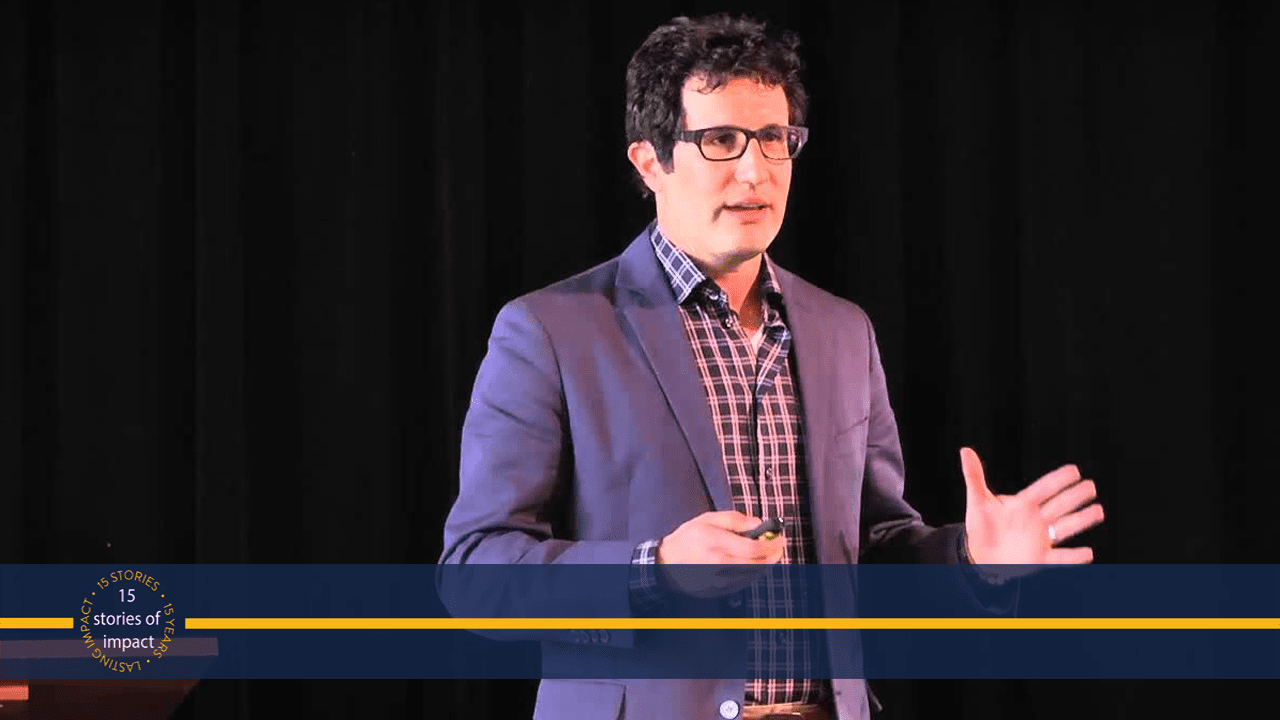Women in CSR: Lynelle Cameron (Haas MBA ’01), Autodesk

What inspires women in CSR, and how did they find their way to careers in sustainability? Read this interview of Haas alumn Lynelle Cameron, Senior Director of Sustainability & Philanthropy at Autodesk, which originally appeared on triplepundit.com.
TriplePundit: Briefly describe your role and responsibilities, and how many years you have been in the business.
Lynelle Cameron: I have a dual role as senior director of sustainability for Autodesk, and president and CEO of our newly created Autodesk Foundation. I have the privilege of working at a company with a tremendous opportunity to influence almost everything that gets built or created on this planet. For those unfamiliar with Autodesk, we provide design software used by architects, engineers, designers and creative people of all ages to design almost anything – from bridges, highways and cars to buildings, consumer products, video games, and even whole cities.
Our corporate mission is to help people imagine, design and create a better world, and our foundation and sustainability programs across the company directly support this mission. My team and I are focused on inspiring, equipping and educating people to use our design technology to address epic challenges so that we can create a future where 9 billion people live well and live within the limits of the planet.
I’ve been in the environmental field for more than two decades – first in the nonprofit sector working on people-planet issues in remote mountain communities around the world, and later focusing explicitly on environmental opportunities within the corporate sector. Before joining Autodesk, I was in a similar role at Hewlett-Packard building a sustainability program – long before there was common jargon to describe this work.
3p: How has the sustainability program evolved at your company?
LC: Autodesk has a team of executives at the top who understand the vantage point they have to influence what is made or built (or not) on the planet. So when I sent the company a letter and later joined Autodesk, there was already momentum and an appetite to take bold steps forward.
Our first step was to address our own environmental footprint, even though it is relatively small as a software company. What started as a team of one only a few years ago, has expanded to include various sustainability teams and hundreds of sustainability-minded employees across the company. One team is focused on developing sustainability solutions for our customers; others are focused on optimizing our footprint within facilities, travel, IT and events; one team is accelerating the clean tech sector by partnering with early stage companies and providing access to our software; and another team is educating millions of students with ourSustainability Workshop and new Building Performance Analysis certificate program. A new team is designing our Foundation, leveraging a 20-year history of community giving. Our latest sustainability reporthighlights our commitment to a better world and the progress we’ve made in a relatively short period of time.
3p: Tell us about someone (mentor, sponsor, friend, hero) who affected your sustainability journey, and how.
LC: Many people have influenced me over the years, but two stand out. Paul Hawken inspired me to get an MBA and join the private sector with his book, The Ecology of Commerce. He’s also been influential in my career decisions, advising me to simply “go where I’m respected.” And Barbara Waugh, in her quest to amplify “positive deviants” at HP, has been an ally at every turn and instilled in me the need for persistence and perseverance, invaluable in the corporate sector.
3p: What is the best advice you have ever received?
LC: My dad instilled in me a desire to contribute and have impact by gently asking me throughout college, “What do you want to contribute to the world?” I guess the best advice is his: we really do get to decide who we want to be in this world and how we choose to contribute.
3p: Can you share a recent accomplishment you are especially proud of?
LC: During one of my first meetings six years ago when I joined Autodesk, my manager said to me: “Your success in this role will be measured by the success of your team.” I have come to realize that one of my most important contributions to the company, and therefore to the planet, is to recruit amazing talent, aggressively remove barriers and obstacles so that they can be successful, and then work like hell to keep them engaged and motivated to join me in driving change from within. The corporate sector desperately needs the talent and expertise we have on our sustainability teams and I’m proud of their many accomplishments.
I am also proud of the many employees not formally in sustainability roles who have stepped in to fill leadership roles – whether for our Autodesk Women in Leadership initiative, volunteer efforts, green teams, etc. Whenever I’m contacted by employees who want to join my team, I immediately look for opportunities for them to contribute from their current role – because we need sustainability allies everywhere.
Changing a corporate culture takes time – but I’m confident we are well on our way.
3p: If you had the power to make one major change at your company or in your industry, what would it be?
LC: If I had a magic wand, I would change how Wall Street measures corporate performance so that public companies are incentivized to make better decisions for our collective future, rather than the narrow focus on short-term profit for shareholders.
3p: Describe your perfect day.
LC: A perfect work day includes a 6 a.m. trail run on Mt. Tam; pancakes with my kids before school; a bike-then-ferry ride to the office; a day of meeting with smart people identifying breakthrough opportunities where we can have real impact; a dinner date with my husband; and then home in time to read with my kids in bed. When my day includes time for personal, family, and professional ambitions – all is well!


